ASPET received numerous applications for the 2018 Washington Fellows program, making the selection process extremely competitive. All submissions were carefully reviewed and the ten strongest applicants were selected to come to Washington, D.C. this spring to speak with their legislators about how to address the challenges facing the scientific community. Additionally, the Washington Fellows will receive complimentary registration to ASPET’s Annual Meeting at Experimental Biology 2018 in San Diego, where they will have the opportunity to network with each other and with Fellows from previous years.
 Tracey ‘Liz’ Bailey
Tracey ‘Liz’ Bailey
Born and raised in Raleigh, NC, Tracey ‘Liz’ Bailey earned her B.S. in Chemistry and Psychology from the University of North Carolina at Chapel Hill in 2015. She then moved to Atlanta, GA where she worked as an ORISE research fellow at the Centers for Disease Control and Prevention. Following her time at the CDC, Liz began graduate school at the Scripps Research Institute in Jupiter, FL. She is pursuing her PhD in the lab of Dr. Patricia McDonald within the Department of Molecular Medicine. Liz’s research interests are primarily focused on identifying novel therapeutic pathways for chronic non-communicable diseases like Type 2 Diabetes Mellitus.
Stephanie Davis
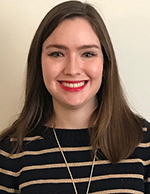
Stephanie grew up in Clearwater, FL and graduated summa cum laude with her Bachelor of Science degree in Biochemistry and Molecular Biology from Florida Southern College. In 2012, she was accepted as a Presidential Doctoral Fellow to the Biomedical Sciences Ph.D. program at the University of South Florida. Her dissertation research, which was performed under the supervision of Keith Pennypacker, Ph.D., focused on the pharmacological targeting of antioxidant enzymes to promote neuroprotection during focal cerebral ischemia. After receiving her Ph.D., Stephanie began her postdoctoral work at the University of Kentucky Center for Advanced Translational Stroke Science. As an ASPET Washington Fellow, Stephanie hopes to enhance funding for STEM education and biomedical research, specifically in the fields of stroke and cardiovascular disease.
Laura Erwin

Laura received her bachelor of science in microbiology from Louisiana State University and upon graduation moved to Dublin, Ireland to gain research experience working with the Ana Liffey Drug Project. After moving back to the United States, she then entered the Pharmacology and Experimental Therapeutics department at LSU Health Sciences Center in New Orleans. As a direct applicant into the Louisiana Board of Regents Superior Graduate Student Training Program, she secured independent funding as a Louisiana Board of Regents Fellow. Under the guidance of Dr. Peter Winsauer, she studies the deleterious behavioral effects of drugs of abuse. Laura’s dissertation research focuses on the interaction between gonadal hormones and cannabinoid abuse, and the subsequent effects this interaction has on development as it relates to learning and memory. Outside of her studies, Laura is actively engaged in outreach and advocacy. In her second-year, she served as the Student Government Vice President for Community Outreach and, now in her third-year, currently serves as the President. In addition, she represents all six schools of the Health Sciences Center on the Louisiana Council of Student Body Presidents. As an ASPET Washington Fellow, Laura hopes to learn more about how to further communication and understanding between the scientific community and our elected officials.

Huijie ‘Jade’ Feng
Jade was born and raised in China. She earned a BS in pharmacy from China Pharmaceutical University in Nanjing in 2014. Following graduation, she entered Michigan State University PhD program in Department of Pharmacology & Toxicology. She is currently in her fourth year. Jade’s research focuses on investigating the mechanisms of a rare genetic mutation caused pediatric neurological abnormalities including epilepsy and movement disorders. As an ASPET Washington Fellow, she is interested in learning how to communicate with elected officials to advocate for promoting diversity and interdisciplinary research and to discuss how support for funding and research for all scholars can impact the future of the nation and the world.
Sterling Glass
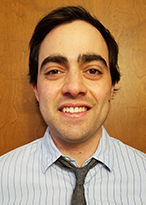
Sterling completed his BS in Marketing at the University of Colorado Boulder and is a former entrepreneur specializing in marketing, fashion, e-commerce, and socially-responsible business practices. Realizing that his true passions lay in the life sciences, he completed a BS in Biology at the University of Colorado Denver and subsequently joined the Pharmacology/Toxicology Doctoral program at the University of Connecticut Storrs. His ongoing research focuses on nanoparticle drug delivery technology in Dr. Xiuling Lu’s lab and involves nanoparticle-mediated approaches to novel anti-cancer therapies. As a Washington Fellow, Sterling is eager to improve communication between scientists and lawmakers to guide evidence-based policymaking.
Lalage Katunga
Lalage was raised in Zimbabwe. She earned her B.S. in Biology from Methodist University in Fayetteville, NC. She spent a year studying nutritional transition and the incidence of chronic disease in indigenous populations (Inuit and Inuvialuit) at UNC Chapel Hill, Nutrition Research Institute, Kannapolis.
 Pursuing her passion for understanding the role of nutrition in disease she began her PhD at East Carolina University, Greenville, NC in the Department of Pharmacology and Toxicology. Dr Katunga’s graduate work focused on the novel role of Glutathione Peroxidase 4 (GPx4) in preventing cardiometabolic disease in obesity. She received numerous awards for her work including the ASPET Travel Award to Cape Town, South Africa for the World Congress of Pharmacology in 2014. Dr Katunga continues to explore the interaction between diet and cardiometabolic disease during her postdoctoral fellowship in the Ford Lab in the Department of Biochemistry and Molecular Biology at Saint Louis University, St Louis, MO. Her research is on the contribution of myeloperoxidase, a leukocyte-derived enzyme mechanistically linked to oxidative stress (ROS), to obesity related diseases.
Pursuing her passion for understanding the role of nutrition in disease she began her PhD at East Carolina University, Greenville, NC in the Department of Pharmacology and Toxicology. Dr Katunga’s graduate work focused on the novel role of Glutathione Peroxidase 4 (GPx4) in preventing cardiometabolic disease in obesity. She received numerous awards for her work including the ASPET Travel Award to Cape Town, South Africa for the World Congress of Pharmacology in 2014. Dr Katunga continues to explore the interaction between diet and cardiometabolic disease during her postdoctoral fellowship in the Ford Lab in the Department of Biochemistry and Molecular Biology at Saint Louis University, St Louis, MO. Her research is on the contribution of myeloperoxidase, a leukocyte-derived enzyme mechanistically linked to oxidative stress (ROS), to obesity related diseases.
Dr Katunga is passionate about increasing the visibility of scientists in the community, especially in underserved and minority communities. She volunteers with local middle schoolers and contributes to science literacy through lay media outlets. As an ASPET Washington Fellow Dr Katunga plans to work to reduce the barrier between biotechnology research and entrepreneurship for young researchers.
Sean Moran
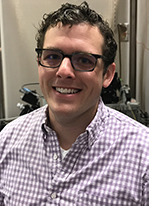
Sean grew up in Niantic, Connecticut and gained his bachelors degree in Biology from Clarkson University. Upon graduation, Sean developed a passion for neuropharmacology research over several years as a research assistant at the Yerkes National Primate Research Center investigating neurological disorders using transgenic nonhuman primate models. Sean is currently a graduate student under the mentorship of P. Jeffrey Conn at the Vanderbilt Center for Neuroscience Drug Discovery at Vanderbilt University. His research focuses on characterizing and understanding the various pharmacological profiles of structurally distinct M1 muscarinic receptor allosteric modulators thereby providing key insight into the therapeutic potential of allosteric modulation of M1 as a potential treatment for the cognitive disruptions found in Alzheimer’s disease and Schizophrenia. As an ASPET Washington Fellow, Sean aims to learn how to effectively communicate with policy makers to ensure continual government investment into basic and translational science.
Filomene Morrison

Filomene was born and raised in Berkeley, California. She earned her bachelor’s degree in Molecular and Cellular Biology from the University of California, Berkeley, and received her PhD in Neuroscience from Emory University. Her thesis research focused on the molecular mechanisms underlying the acquisition and extinction of learned olfactory fear memories, under the direction of Dr. Kerry Ressler. Filomene is currently a postdoctoral fellow in Dr. Erika Wolf and Dr. Mark Miller’s laboratory at Boston University School of Medicine. Her research examines how the stress of posttraumatic stress disorder (PTSD) and related conditions influence the aging process at the cellular level and impact neuroinflammatory processes in the brain. As an ASPET fellow, Filomene hopes to use her training in scientific research to advocate for the informed and effective use of scientific knowledge and discoveries in governmental and judicial decision making and science policy.
Ryan Stoudt
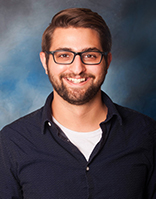
Ryan was born and raised in the suburbs of Philadelphia, but his education has since taken him to other exotic Pennsylvania locations like State College and Pittsburgh. He received his bachelor's degree in immunology and infectious disease at Penn State University, and through his undergraduate research and coursework Ryan developed a deep interest in both drug discovery and molecular virology. Those interests led him to attend graduate school at the University of Pittsburgh, where he is currently pursuing a Ph.D. in molecular pharmacology. Under the mentorship of Dr. Thomas Smithgall, Ryan has been working to develop small molecule inhibitors of the HIV-1 accessory protein Nef, a project which blends together training in pharmacology, structural biology, and virology. Ryan’s love of writing and communication runs as deep as his love of biomedical research, and he plans to pursue both passions through a future career in science policy. As an ASPET Washington Fellow, Ryan hopes to serve as an effective advocate for biomedical and basic research, and help lawmakers understand the essential challenges, common misconceptions, and funding needs behind that research.
Jared Tur
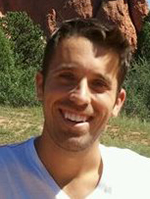
Jared received his bachelors of Science degree in biomedical sciences as well as a bachelor’s of Arts in anthropology from the University of South Florida. His PhD is in medical sciences where he specialized in cardiovascular physiology examining the novel roles of potassium channel regulators at the USF-College of Medicine. Currently as a postdoctoral fellow, Jared investigates novel pharmaceutical therapies including nanoparticle formation for the treatment of cardiovascular disease including heart attacks and heart disease. Dr. Tur has remained active in advocacy work in postdoctoral affairs writing for the National Postdoctoral Association. Through the Washington Fellows program, Dr. Tur hopes to gain a greater insight into advocating for postdoctoral affairs and young investigators receiving adequate funding and support. He is looking forward to this unique interactive experience meeting congressional delegates to truly advocate for support.